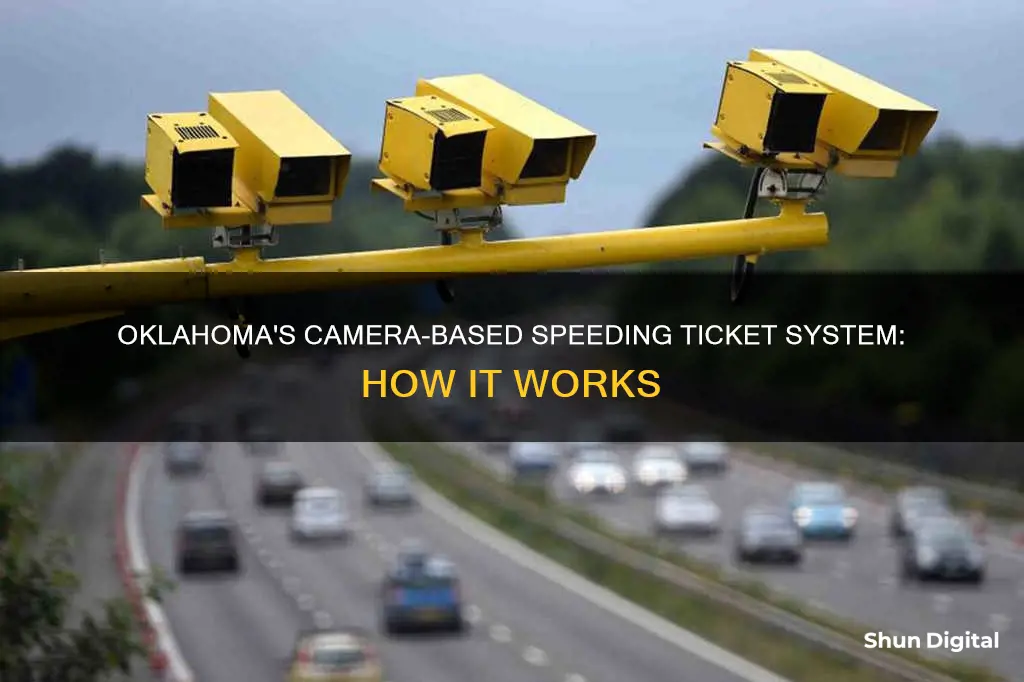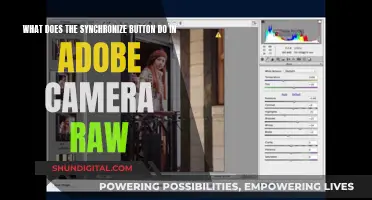
Oklahoma has two types of speeding laws: a basic speeding law and absolute limits. The fines for speeding in Oklahoma depend on the amount by which the driver exceeded the speed limit. Fines range from $10 for speeding 1-10 mph over the limit to $205 for speeding 36 mph or more over the limit. In addition to fines, speeding tickets can also result in jail time and demerit points on your driving record. While Oklahoma does not have any state law or programs for speed cameras, individual municipalities may have their own rules and fines for speeding violations.
| Characteristics | Values |
|---|---|
| Number of types of speeding laws | 2 |
| Names of speeding laws | "Basic speeding law", "Absolute limits" |
| Basic speeding law definition | "No motor vehicle shall be driven at a speed greater than is careful and prudent and not greater than or less than is reasonable and proper, having due regard to the traffic, surface and width of the highway and of any other conditions then existing. No person shall drive any vehicle upon a highway at a speed greater than will permit him to stop within the assured clear distance ahead." |
| Absolute speed limits | 25mph in most school zones, 35mph in state parks or wildlife refuges, 45mph on highways within state parks or wildlife refuges, 55mph on county roads, 65mph on two-lane highways, 75mph on four-lane highways or interstates |
| Fines for speeding | $10 for 1-10mph over the limit, $20 for 11-15mph over the limit, $35 for 16-20mph over the limit, $75 for 21-25mph over the limit, $135 for 26-30mph over the limit, $155 for 31-35mph over the limit, $205 for 36mph or more over the limit |
| Maximum jail time for speeding | 10 days for a first offense, 20 days for a second offense within a year, 6 months for a third or subsequent offense within a year |
| Traffic violation points for speeding | 2 to 4 points |
| Reckless driving definition | Speeding and driving in a "careless or wanton manner" |
| Penalty for reckless driving | First offense: 5 to 90 days in jail and/or $100 to $500 in fines. Repeat offense: up to $1,000 in fines and/or up to 6 months in jail |
| Areas in Oklahoma with red light cameras | None |
| Areas in Oklahoma with speed cameras | None |
What You'll Learn

Oklahoma's speeding laws
Oklahoma has two types of speeding laws: a "basic speeding law" and "absolute limits".
The basic speeding law requires motorists to drive at a speed that is "careful and prudent" and "reasonable and proper" given the traffic, surface and width of the highway, and other conditions. In other words, motorists must always drive at a safe speed. For example, driving 75 miles per hour on the interstate on a sunny day may be safe, but if it's dark and the road is icy, driving at that speed would be dangerous and a violation of the basic speeding law.
The absolute speed limits are more straightforward: if there's a fixed speed limit posted, you cannot drive faster than that limit. Absolute speed limits include:
- 25 miles per hour in most school zones
- 35 miles per hour on highways in state parks and wildlife refuges
- 45 miles per hour on highways within state parks or wildlife refuges
- 55 miles per hour on most county roads
- 65 miles per hour on two-lane highways
- 75 miles per hour on four-lane highways or interstates
Speeding violations in Oklahoma can result in fines, jail time, or both. The fines depend on how much the driver exceeded the speed limit:
- 1 to 10 miles per hour over the limit: $10 fine
- 11 to 15 miles per hour over the limit: $20 fine
- 16 to 20 miles per hour over the limit: $35 fine
- 21 to 25 miles per hour over the limit: $75 fine
- 26 to 30 miles per hour over the limit: $135 fine
- 31 to 35 miles per hour over the limit: $155 fine
- 36 miles per hour or more over the limit: $205 fine
The maximum jail time for a first speeding offence is generally ten days, 20 days for a second offence within a year, and six months for three or more offences within a year. Speeding violations will also result in demerit points on the driver's record, typically between one and four points. Accumulating 10 or more points within a five-year period will result in a license suspension.
In addition to the standard fines and penalties, speeding in a school zone, construction zone, or other protected areas will typically result in doubled fines. Reckless driving, which is determined by the circumstances surrounding the incident rather than a set speed limit, is a more serious offence that carries higher penalties, including a minimum of four demerit points.
Accessing Camera Debug Mode in Elite Dangerous
You may want to see also

Fines for speeding in Oklahoma
Speeding fines in Oklahoma vary depending on the city and the severity of the offence. In Tahlequah, for example, speeding in a school zone will cost you $235, while the same offence in Norman will set you back $285.
- Speeding up to 10 mph over the limit: $172
- 11-19 mph over the limit: $203
- Speeding in a residential area: $213
- Speeding in a school zone: $213
However, the financial consequences of speeding don't end with the fine. Speeding tickets can cause your insurance premium to increase substantially. Oklahoma drivers with clean records pay, on average, $2,585 for full coverage per year and $519 for minimum coverage per year. After a first speeding ticket, these costs can rise to $3,040 and $617, respectively.
The state also imposes jail time for speeding offences, particularly for repeat offenders. For a first offence, jail time should not exceed 10 days; for two speeding offences within a year, no more than 20 days; and for three or more speeding offences within a year, you may be sentenced to up to six months in jail.
Mastering Camera Modes for Artistic Background Blur
You may want to see also

Jail time for speeding in Oklahoma
In Oklahoma, speeding violations can result in a fine, jail time, or both. The penalties depend on the type of speeding ticket issued, the amount by which the driver exceeded the speed limit, and their past driving history.
Oklahoma has two types of speeding laws: "basic speeding law" and "absolute limits". Basic speeding law means that the speed at which a person can safely drive is dictated by the current conditions. For example, driving at 65 mph when the interstate is foggy or icy would be considered unsafe and a violation of the basic speeding law. On the other hand, absolute limits refer to fixed speed limits; if the speed limit is 50 mph and a driver exceeds this limit, they have violated the law.
The fines for speeding in Oklahoma are as follows:
- $10 fine for speeding 1 to 10 mph over the limit
- $20 fine for speeding 11 to 15 mph over the limit
- $35 fine for speeding 16 to 20 mph over the limit
- $75 fine for speeding 21 to 25 mph over the limit
- $135 fine for speeding 26 to 30 mph over the limit
- $155 fine for speeding 31 to 35 mph over the limit
- $205 fine for speeding 36 mph or more over the limit
Fines for speeding in school and construction zones are typically doubled.
In some cases, individuals may also be sentenced to jail time for speeding violations. The maximum jail time for a first offense is generally 10 days, 20 days for a second offense within a year, and six months for three or more offenses within a year. However, in Tulsa, aggravated speeding, which is defined as speeding more than 20 mph over the posted speed limit, can also result in up to 10 days of jail time.
In addition to fines and jail time, speeding violations in Oklahoma can result in demerit points being added to a driver's record. Speeding violations typically result in 2 to 4 demerit points. Accumulating 7 demerit points can result in a hearing with the Oklahoma Department of Public Safety, and accumulating 10 or more points within five years can lead to a license suspension.
Speeding violations can also have a significant impact on insurance premiums, with drivers often experiencing an increase of 18-19% in their insurance costs after a speeding ticket.
Troubleshooting Camera Battery Issues: A Quick Fix Guide
You may want to see also

Demerit points for speeding in Oklahoma
In Oklahoma, speeding violations often result in 2 to 4 demerit points per violation. The exact number of points depends on the severity and circumstances of the speeding violation. For example, speeding in excess of 25 mph over the limit will result in 3 speeding ticket points.
If a driver accumulates 7 demerit points on their record, they will be required to attend a hearing with the Oklahoma Department of Public Safety (DPS). After this hearing, they may have to attend a driving course, retake their driving test, or submit to physical and mental evaluations.
Drivers who accumulate 10 or more demerit points within a five-year period will face an irreversible suspension of their driver's license. The length of the suspension depends on the number of prior suspensions the driver has. A first-time suspension will last one month, while a second suspension will last three months. A third suspension will result in a six-month suspension, and a driver with three or more prior suspensions will have their license suspended for a year.
In Oklahoma, two demerit points are deducted from a driver's record every 12 months without a moving violation. If a driver goes three consecutive years without any traffic convictions, their record will reset to zero points.
Dash Cam Power: Staying Charged and Ready
You may want to see also

Fighting a speeding ticket in Oklahoma
Understanding the Law
Firstly, it's important to understand Oklahoma's speeding laws and the type of speeding ticket you've received. Oklahoma has two types of speeding laws: "basic speeding law" and "absolute limits". Basic speeding law means that the speed limit depends on the current conditions. For example, driving 65 mph on an icy interstate road is not considered "reasonable and proper". Absolute limits, on the other hand, means that you cannot drive faster than the speed limit posted, regardless of the conditions.
Weigh Your Options
You have the right to fight your speeding ticket in court, but consider the costs of doing so. Weigh the costs of court and attorney fees against the fines and insurance hikes that will result from the ticket. You have 15 business days to decide if you want to appear in court.
Plead Your Case
If you decide to fight your ticket, you can either represent yourself or hire an attorney. An attorney will be more expensive, but they can conduct an independent investigation, negotiate a plea bargain, spot bases for dismissal, and file an appeal if necessary. If you represent yourself, you will have access to court resources to help you prepare for your trial.
Plea Bargain
You can also try to fight your ticket without going to trial by making a plea bargain. After entering a not-guilty plea, you can negotiate with the prosecutor, who may agree to downgrade the violation to a lesser one with lighter sanctions.
Get the Ticket Reduced or Dismissed
If you acknowledge guilt and can prove that the speeding violation was unintentional, the judge may reduce the ticket during the mitigation hearing. You may also be able to get the ticket dismissed by enrolling in a driving improvement course, especially if you haven't taken one recently.
Understand the Consequences
Keep in mind that if you plead guilty or are found guilty, you will have to pay the ticket, and your insurance rates may increase. You will also receive demerit points on your driving record, which can lead to a suspension of your driver's license if you accumulate too many points.
Smart Doorbell Camera Options Without Monthly Fees
You may want to see also
Frequently asked questions
No, Oklahoma does not currently have any speed cameras.
Oklahoma enforces speed limits through police officers who use radar guns to track the speed of vehicles.
Speeding violations in Oklahoma can result in fines, jail time, or both. The fines depend on the amount by which the driver exceeded the speed limit and typically range from $10 to $205. The maximum jail time for a first offense is 10 days, 20 days for a second offense within a year, and 6 months for three or more offenses within a year.
Yes, speeding in Oklahoma can also result in demerit points being added to the driver's record, which can lead to a suspension of the driver's license if 10 or more points are accumulated within 5 years. Additionally, insurance premiums may increase substantially after a speeding violation.
Yes, you have the option to fight a speeding ticket in court. You can plead not guilty, guilty, or no contest. In some cases, the judge may reduce or dismiss the ticket or allow you to attend a driving course to clear the ticket from your record.







